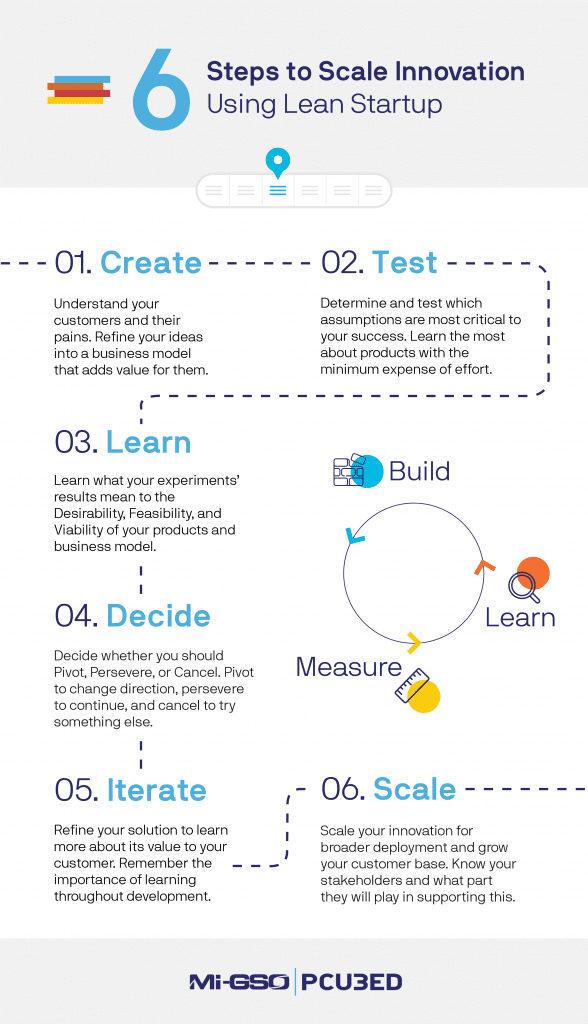Our website is not supported on this browser
The browser you are using (Internet Explorer) cannot display our content.
Please come back on a more recent browser to have the best experience possible

The Innovation Hub of an important government client engaged MIGSO-PCUBED to deliver Innovation Framework consulting services to enable and encourage innovation across their organisation. By employing Lean Startup methodologies, we discovered organisational challenges facing innovators, then developed products and services to address those challenges. Our aim was to guide our client to reach the 95% of the organisation that did not currently engage with the Innovation Hub.

There were various reasons why participation was low. Some respondents were concerned with security, logistics, and legalities. Others simply thought that the Innovation Hub wasn’t for them. Even worse, though, was the perception that their managers wouldn’t want them using it.
Of the 118 respondents to our survey, 68% agreed or somewhat agreed that they didn’t have the time to innovate. But here’s the catch – it’s not about spinning more time out of thin air. Leaders need to give their teams the permission to innovate in order for it to flourish. Otherwise, it’s incredibly difficult to get any real traction behind it.
Of the 118 respondents to our survey, 68% agreed or somewhat agreed that they didn’t have the time to innovate.
It’s an issue with two sides. First, many managers (falsely) believe that their employees won’t contribute value if they’re pursuing innovation. On the flip side, employees fear judgement or retribution for spending time tinkering with new ideas. This cause and effect relationship makes for an environment that discourages potential.
However, when given time to pause and reflect, people often think of ways to make their jobs easier. So, when leadership is backing them, they’ll be able to streamline their work for everyone’s sake.
By prioritizing innovation, you create the environment where people are comfortable with innovation. As more contributions are made, you’ll have effectively scaled innovation across the organisation.
Innovation can be a messy and aimless process if you’re just coming up with ideas for ideas’ sake. That is wasteful, but it doesn’t need to be. While you won’t know what you’ll discover, you can put yourself on an intentional path to get there.

Our team knew that the right mix of products and services were necessary to scale innovation across the organisation. To start, we needed to find out what those products and services should be.
First, we learned about how innovators work, their pains, and their achievements. A local Customer Safari (learning about your customers by being in your customers’ environments) answered these questions for us.
Then, we validated these findings by running a Customer Survey across the organisation. We explored what innovators wanted from an Innovation Hub, collecting feedback from more than 200 people.
We then developed Value Propositions and described products that may add value to the innovators. We designed and conducted experiments to test the Desirability, Feasibility, and Viability of these as Minimum Viable Products (MVP). Products which included an Innovation Community, an Innovation Framework, and an Innovation Competition.
An innovation community is a motivated team who work together to share ideas and resources in order to improve their organizations.
The Innovation Framework is a three phase process that turns ideas into products. First is the Ideate phase. It uses design thinking to identify critical improvement opportunities for customers and envisions possible solutions.
Next is the Innovate phase, where we use Lean Startup. It brings people who do the job together, details the opportunities, and gives them time to develop a proof of concept.
Last is the Improve phase, which leverages Agile scaling. With their proof of concept, teams are empowered to keep developing themselves across the enterprise.
An innovation competition incentivises people to create fresh new ideas in a short period of time. By using rewards, people will be motivated to put their heads together and transform their fields.
The approach to all three innovation products – Innovation Community, Innovation Framework, and Innovation Competition – was fairly similar. We again used the Lean Startup Method. We designed an MVP that we could build, measure, and learn from a sample of our end customers.
Based on their feedback, we then iterated and improved upon the design. Lastly, we proceeded to build final products that could launch and then scale to the rest of the organisation.
At the end of the engagement, our client had a clearer understanding of the challenges facing innovators across the organisation. They also had a set of products and a fledgling Innovation Community, created to drive growth within the organisation.
By meeting the demand for innovation processes, this government office scaled innovation across the organisation.
Loved what you just read?
Let's stay in touch.
No spam, only great things to read in our newsletter.
We combine our expertise with a fine knowledge of the industry to deliver high-value project management services.
MIGSO-PCUBED is part of the ALTEN group.
Find us around the world
Australia – Canada – France – Germany – Italy – Mexico – The Netherlands – Portugal – Romania – South East Asia – Spain – Switzerland – United Kingdom – United States
© 2024 MIGSO-PCUBED. All rights reserved | Legal information | Privacy Policy | Cookie Settings | Intranet
Perfect jobs also result from great environments : the team, its culture and energy.
So tell us more about you : who you are, your project, your ambitions,
and let’s find your next step together.
Dear candidates, please note that you will only be contacted via email from the following domain: migso-pcubed.com. Please remain vigilant and ensure that you interact exclusively with our official websites. The MIGSO-PCUBED Team
Choose your language
Our website is not supported on this browser
The browser you are using (Internet Explorer) cannot display our content.
Please come back on a more recent browser to have the best experience possible
